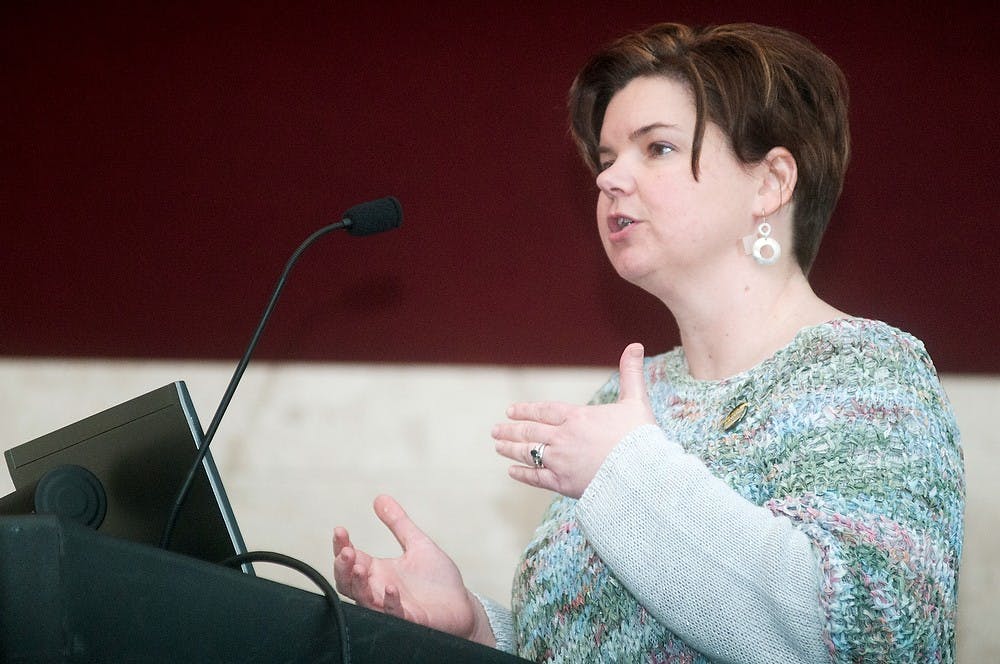Picture the typical MSU party environment: a combination of young men and women, loud music, binge drinking and some sexual interactions behind closed doors.
But many of these sexual encounters on colleges, such as MSU, aren’t always consensual.

MSU psychology professor Dr. Rebecca Campbell gives a presentation on the neurobiology behind sexual assault on Friday, Feb. 22, 2013, in the MSU Union Ballroom during the Title IX Symposium: Addressing & Preventing Sexual Assault on our Campus. Campbell informed attendees of the importance of first responders after a sexual assault has occurred. Danyelle Morrow/The State News
Picture the typical MSU party environment: a combination of young men and women, loud music, binge drinking and some sexual interactions behind closed doors.
But many of these sexual encounters on colleges, such as MSU, aren’t always consensual.
According to the MSU Office for Inclusion and Intercultural Initiatives, or OIII, nationally, one in every five college women and one in 20 college men will be a victim of sexual assault while on campus — a statistic MSU officials acknowledge and are trying to combat by launching a new campaign, “There’s No Excuse for Sexual Assault.” Excuses Sexual Assault Campaign Poster.pdf
OIII’s campaign was revealed on Friday afternoon at the Title XI Symposium: Addressing & Preventing Sexual Assault on our Campus, an event where about 200 MSU community members including students, faculty, staff and administrators, gathered to learn about how one should respond to a sexual assault “survivor” and how to prevent future assaults.
OIII Director Paulette Granberry Russell said the campaign’s goal is to educate individuals about the impacts of sexual assault and recognize that it happens on all college campuses, MSU included.
The campaign works with students and provides T-Shirts, buttons and posters advocating against all forms of sexual assault.
“It may result in an increased number of sexual assaults that are reported, but that’s not a bad thing,” she said. “It means that the individuals are getting the support that they need (and) that the institution is responding appropriately.”
At the symposium, psychology professor Rebecca Campbell, who researches violence against women and children, stressed the importance of the “first responder,” or the first person a sexual assault victim reaches out to.
It is dire that person “starts by believing” the victim and provides support, she said.
“The goal is about educating first responders about how to help, so that when victims reach out, they are not re-traumatized,” Campbell said. “What happens between you and your friend at that point of disclosure is critically important in what his or her mental health is going to be. It’s a huge responsibility.”
Women and gender studies sophomore Mara Abramson, who works as a peer educator for MSU’s Sexual Assault and Relationship Violence Prevention Program, or SARV, said she has had loved ones confide in her who have been victims of sexual assault and realizes the importance of this responsibility.
Because of these second-hand experiences, Abramson said she always keeps an eye out, knocking on every door if she loses one of her friends at a party.
In these types of party situations, Campbell said students should be aware of their surroundings and think about sexual assault situations from a “bystander approach.”
“It’s not, ‘What I can do to protect myself?’ (It’s), ‘What can we do to protect each other?” she said.
She said students should consider how much they are drinking, who they are with, if people know where they are and whether or not someone will intervene if the situation goes awry.
Women and gender studies sophomore Ryan Tarr is involved in student organizations advocating against sexual assault on campus, such as Compass and SARV, and said he believes students are responsive to sexual assault.
“You’re not going to find anyone on campus who thinks that rape is OK, and the first step to stopping rape is spreading the information and to get people to start taking a stronger stance,” he said. “… it’s the culture that enables rape, and we have to fight that culture.”
Support student media! Please consider donating to The State News and help fund the future of journalism.